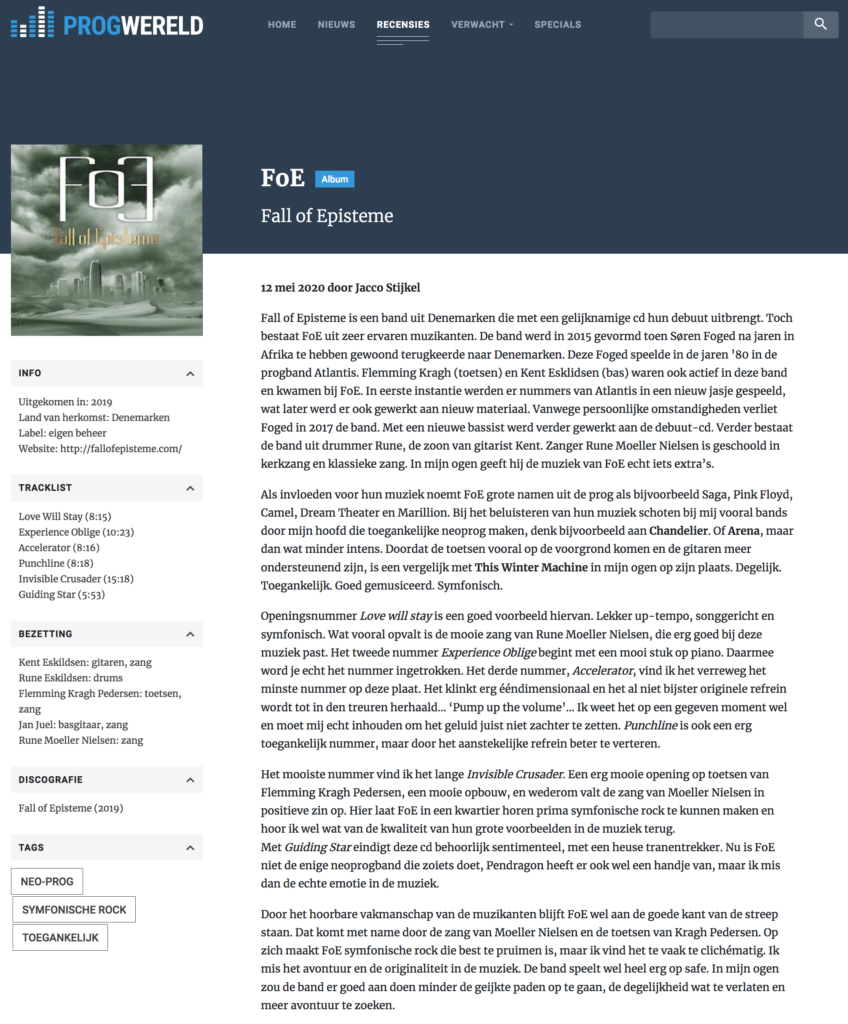Reviews
The debut release has been well received by the Fans and Prog Critiques.
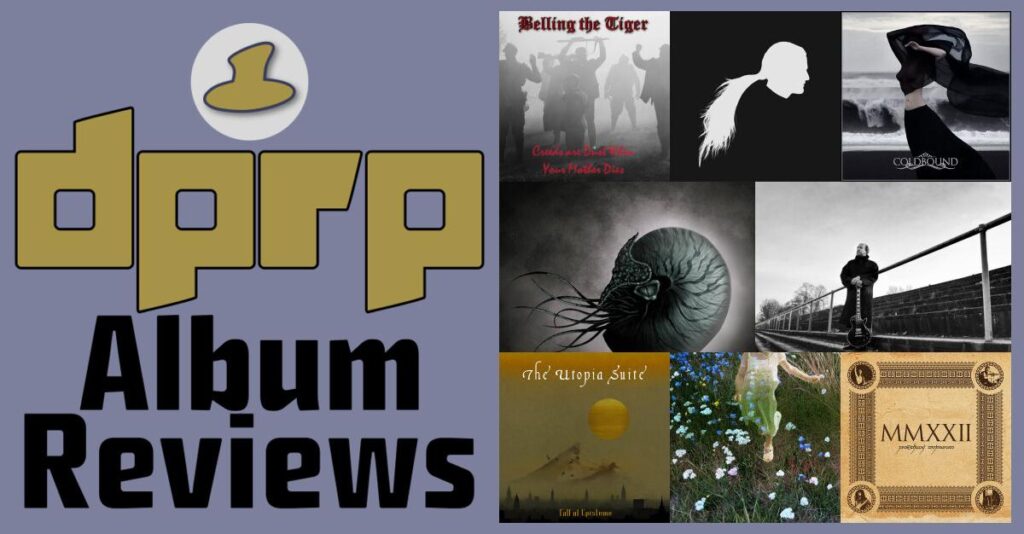
After their fine 2019 self-titled debut album it has been fairly quiet around Fall of Episteme. This silence has now been broken with the release of this EP consisting of an eponymous title-track and its radio-edited mini-version.
It looks like the band has undergone a small line-up change because both singer Rune Nielsen and bassist Jan Juel aren’t part of the recordings, although surprisingly Juel is actually pictured in the promotional photos. Regardless of this unclarity, which may find its origin in the recording period of the song (2018-2023), it soon becomes clear that they have had little-to-no effect on the EP’s final outcome. For the remaining members Kent B. Eskildsen (guitars, bass, flute, keyboards, backing vocals), Rune B. Eskildsen (horn, trumpet, cornet, drums) and Flemming K. Pedersen (vocals, keyboards), aided by Christine H. Elkjær (cello) and Tina Søndergaard (backing vocals), pick right up where they left off.
As before they present a wonderfully crafted and diverse composition, in an upgraded production, that shows an attractive array of 80s-inspired neo-progressive rock with enjoyable melodies reminiscent of Comedy Of Errors, Saga, and a touch of Magnum.
The latter reveals itself in the final stages of the song, which is effectively the edited Living in Utopia part. Here melodic rock, solid vocals, hardrock-like riffs and lush synth-laden melodies are complemented by great guitar play to bring memories of FoE’s own Punchline.
On its own, this abridged version works splendidly and indeed has a radio-friendliness. It works best though as the closing section of the excellent musical journey that leads up to it.
These initial ten instrumental minutes are actually when FoE show their full potential. First with an intricately created paradise of classical-inspired symphonic melodies designed by violin, cello and acoustic guitar mindful to recent Comedy of Errors efforts.
This is followed by a long passage linked by a chain of returning themes in which ethereal choirs and dynamic bombast bring impressions of Saga, after which alluring flute melodies and a chemistry between guitars and synth in combination with folk atmospheres yield Jethro Tull visions. This enchanting movement then takes flight with dreamy synths, embraced a refreshing breeze of graceful melodies, after which the music blissfully settles in the uniting surroundings of the concluding Living In Utopia.
Overall The Utopia Suite is a fine continuation of promise that this band expressed on their debut album and comes heartily recommended for neo-progressive rock fans who enjoy the authentic musical sounds of the 80s. Full album next please guys!
By Jan Buddenberg – www.dprp.net
After their first eponymous album released in 2020 , the Danish group Fall of Episteme returns with “The Utopia Suite” an EP of only two tracks, the title track “The Utopia Suite” long of almost seventeen minutes and “Living In Utopia” of just over six minutes.
Fall of Episteme should be added to the list of bands that explore vintage progressive rock in a convincing and rather appealing way. Faithful to the progressive tradition, the first title “The Utopia Suite” multiplies the themes which follow one another in a very fluid way, the different musical explorations unfold naturally with a good effort on the transitions thus reinforcing the unity of the composition. Mainly instrumental on its half, where only a few female choirs are present, the song takes off in the second part, reinforcing the ultra-melodic character of the main motif.
One of the strengths of this long epic lies in the quality and richness of the melodies, alternating between dynamic rhythms and calmer ones, the atmospheres are sometimes melancholy, mind-blowing(“planantes”), acoustic or symphonic, but always sumptuous. The other strengths of The Utopia Suite lies in the interpretation, whether on guitar, flute, or synths, and in the magnificent solos developed in each theme.
Small disappointment for the second track, “Living In Utopia” is not an original title, but the cover of the first piece cut off from the excellent instrumental intro.
Short, but extremely enjoyable “The Utopia Suite” brings together in soundscapes of brilliance and pure beauty all the quintessence of progressive rock. To discover on Bandcamp !
Group formation
Kent B. Eskildsen: all electric and acoustic guitars, bass, flute, keyboards and backing vocals – Flemming K. Pedersen: vocals and keyboards – Rune B. Eskildsen: horn, trumpet, cornet and drums – Christine H. Elkjær: cello – Tina Søndergaard: backing vocals – Music composed by Kent Eskildsen
Original in French by Gabriel

…and great new interviews with Pendragon, Nightwish, Happy the Man, NEKTAR The Legendary Rock Band, Lazuli, Myrkur, Novena, Jack Hues, Prognosis Festival and more. Plus Gandalf’s Fist, John Holden Music, Fall of Episteme and more on the CD.
– Prog Magazine – Prog 107, on sale Thursday March 5!
Hi guys, received the Prog magazine with the Prog cd I listen everyday your track, Invisible Crusader, fantastic piece. Congrat! Thank you so much for your music, it reliefs, in this days of house confination here in Spain. Big hug from Malaga, Spain
- Mely Fernandez, 18/03/2020
Excellent track on the Prog mag cd…. Impressed
- – Malcolm Huxley-Dugga – 03/03/2020
Just enjoyed Invisible Crusader from Prog CD. Well done guys!
- Åndrew Hamar – 29/02/2020
What IS all the fuss all about with Genesis? If you want to hear a really good slab of top-class modern prog, just listen to track 1 on the latest mag CD – ” Invisible Crusader ” by Fall of Episteme , absolutely brilliant IMO!
- Steve Reynolds – Prog Magazine Readers – 07/03 2020
Lol yeah, that tune sure was right up there with the best of Genesis
- – Paul Swietek – Prog Magazine Readers – 07/03 2020
Luckily I had a subscription to Prog Magazine. Otherwise I probably wouldn‘t have noticed you. The song on the CD is incredible, I love it! I have now listened to the entire album on Spotify a few times. I MUST HAVE THE CD! I will order it later today. I hope to see you in Germany when we have overcome the crisis. All the best, Carsten
One more personal note: I am a huge fan of bands like Marillion (since 1985), IQ, Pendragon (since the mid nineties), etc. So, I’m a true expert for longtracks The whole album is excellent. Especially “Invisible Crusader” is a masterpice, really! I love the heavy guitar riffs that may have influenced by Iron Maiden’s “Empire of the clouds”?!
And as I wrote before, I would love to saw you live here in (the north) of Germany, hopefully soon.”
- Carsten Horn – 19/03/2020


Fall of Episteme, un combo Danois, a vu le jour en 2015, il propose aujourd’hui son premier album éponyme. Fall of Episteme puise ses influences de groupes comme Saga, Pink Floyd, Camel, Jethro Tull et Tangerine Dream, mais aussi de formations plus récentes telles que, Ayreon, Dream Theater et Marillion.
Et effectivement, musicalement cela se ressent, Fall of Episteme évolue dans un rock progressif classieux et incisif, dans l’esprit de ses aînées. Les six compositions sont ambitieuses et naviguent dans un bel équilibre, alliant fraîcheur et efficacité, il s’ensuit une musique qui ingurgite et retranscrit bien les styles inhérents au prog. Fall of Episteme est exigeant et signe ici d’excellents titres.
Le puissant et mélodique « Love Will Stay » qui ouvre les hostilités, est diablement percutant grâce à des refrains mélodiques entraînants et des soli de guitares extrêmement bien pensés. Une forte émotion se dégage au travers du long et atmosphérique « Experience Oblige », une composition mid-tempo qui alterne les passages planants et les arrangements symphoniques subtils avec un côté sombre et ténébreux. Toujours sur un tempo assez lent « Accelerator », est plus ramassé et direct, la batterie prenant le devant de la scène sonore puis la délaisse au profit des autres instruments qui délivrent sur une cadence plus rapide un concentré d’énergie et de de riffs généreux. « Punchline » prend le temps de se développer et de grimper en puissance avec un refrain rentre dedans des plus saisissant, pour laisser la place dans son final à un clavier déconcertant d’efficacité.
Comme dans tout bon album de prog qui se respecte Fall of Episteme nous met en pâture un très long titre à tiroirs de plus de 15 minutes, « Invisible Crusader ». L’exercice est difficile, il en faut de la matière pour réussir son coup, mais là c’est évident, la simplicité de la ligne mélodique et les nombreux breaks instrumentaux alliées à une exigence sans concession de produire un titre de qualité en font un must. Un morceau qui atteint le haut du panier des compos prog tant elle est déconcertante d’efficacité. Une bouffée d’air frais, « Guiding Star » pour terminer en beauté la découverte de ce bien bel album, acoustique et finesse sont au rendez-vous pour cette ballade romantique ponctuée par les interventions d’un piano cristallin et un sax vaporeux.
Fall of Episteme produit une musique concise et directe, où la recherche de la perfection en est le maître mot, mais sans oublier la chaleur et la richesse émotionnelle dont il se pare pour faire de cet album une véritable réussite !
Formation du groupe
Flemming K. Pedersen, claviers et chœurs – Rune RB Eskildsen, batterie – Jan Juel, basse – Kent B. Eskildsen, guitares et chœurs – Rune M. Nielsen, chant
Danish Transelation
C’è del prog anche in Danimarca… Si, perché i Fall Of Episteme (FoE) si formano nel 2015 proprio in Danimarca su iniziativa del bassista Søren Foged a cui si unirono il batterista Rune B. Eskildsen, il chitarrista Kent B. Eskildsen ed il cantante Rune M. Nielsen. Alcuni di loro provenivano da un’altra prog band, gli Atlantis, attiva già negli anni ’80, pur senza pubblicare mai un album. E’ stato quasi automatico utilizzare (rivisitandole) alcune delle vecchie composizioni (cui se ne sono aggiunte altre) degli Atlantis per integrare il repertorio dei FoE. Dopo l’uscita dal gruppo di Foged, la line up della band si è completata con Jan Juel al basso e Flemming Kragh Pedersen alle tastiere.
Lontano dalle malinconiche atmosfere di molte band svedesi o norvegesi, il sound dei FoE è invece solare, melodico, arioso, più vicino, dunque, al new prog anglosassone con qualche incursione – minima invero – nel metal (trend di molte band di oggi) e nell’AOR. Il risultato, per gli amanti del genere, è soddisfacente ed i sei brani, per un’ora circa di durata complessiva, si ascoltano con piacere. In sintesi, i riferimenti dei cinque danesi sono i Floyd gilmouriani, i Pendragon delle origini, gli Jadis, i Collage polacchi ed altri ancora.
I due brani più intriganti sono la lunga “Experience oblige” e la suite “Invisible crusader”. La prima si apre con le delicate note del piano che ci cullano assecondando la voce di Nielsen nella prima strofa. Si aggiungono i poderosi synth di Pedersen a formare un tappeto sonoro costante su cui si posa una ritmica discreta e mai debordante. L’interpretazione sofferta del vocalist ben si sposa con l’atmosfera del brano che prende quota con un refrain convincente.
Non mancano i ficcanti interventi dell’elettrica di Eskildsen dal buon gusto melodico. Insomma, senza strafare, il pezzo confezionato è decisamente di livello. Ancora meglio “Invisible crusader”, un vero trionfo di tastiere vigorose, dinamiche complesse, ma, al tempo stesso fruibili e con ritornelli subito memorizzabili. Delle quattro composizioni rimanenti, tre superano gli otto minuti (“Love will stay”, “Accelerator” e “Punchline”) e seguono gli input forniti dai due brani più lunghi: un bel punch, buone melodie orecchiabili, qualche spruzzata radio-friendly, chitarre romantiche e tastiere scintillanti. Insomma, un sound gustoso per gli amanti del new prog di qualità. Chiude quest’album d’esordio “Guiding star”, quasi sei minuti, dall’incedere più pacato (a parte il finale…) e da “accendino acceso”… Non male comunque.
Ogni anno escono decine e decine di lavori new prog… Belli, brutti, mediocri, anonimi… L’esordio della band danese rientra senz’altro nella prima tipologia… anche se senza novità o scossoni… ma va bene anche così talvolta.
Arlequins.it
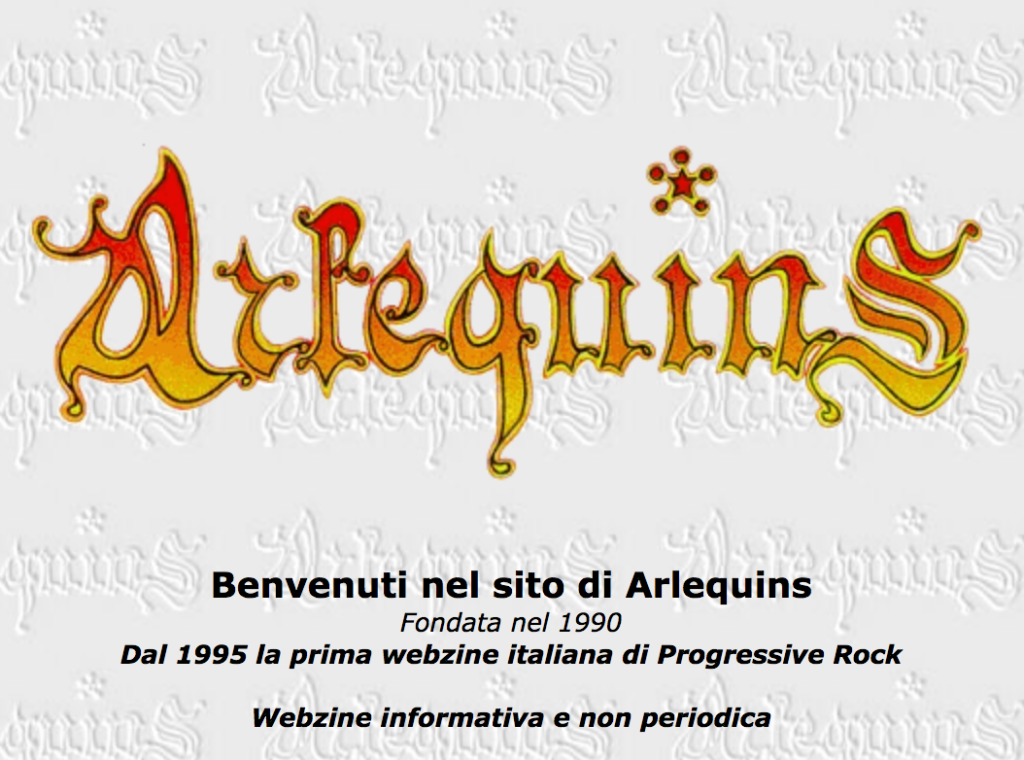
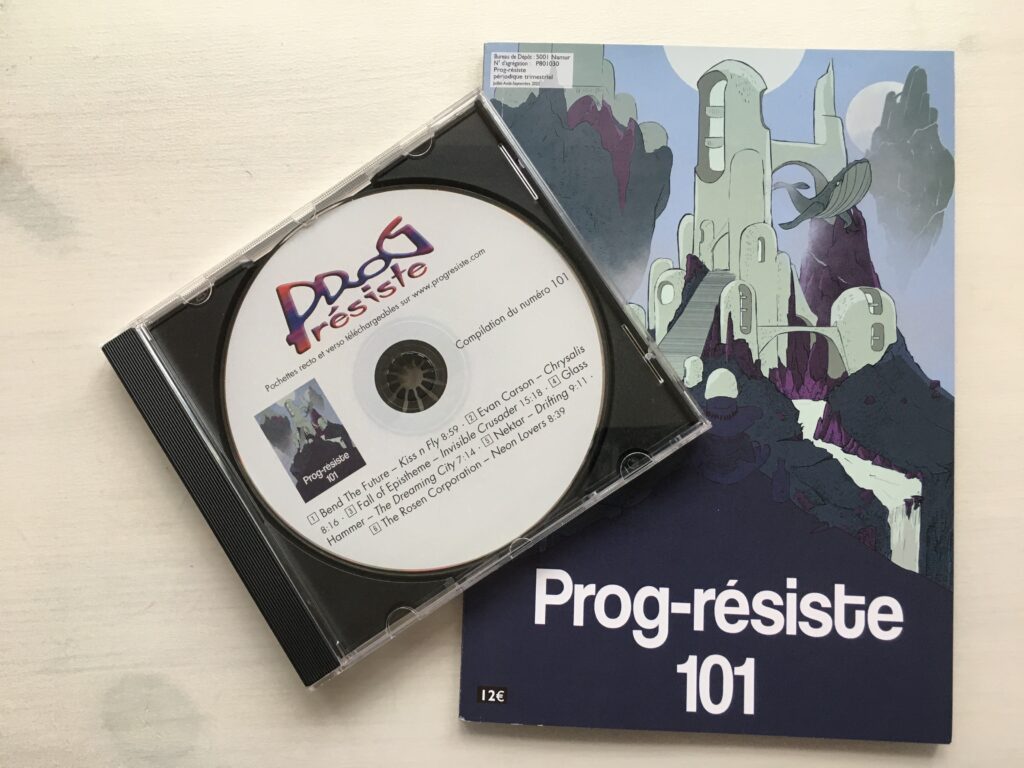
bon album ! www.fallofepisteme.com
Assurancetourix
FALL OF EPISTEME Timescape Production – 54’03 – DNK’19 Néo-progressif CMN8–AQ7–ODZ–CB8 Le progressif venu du nord, on connaî : nombre de groupes de Suède, de Norvège, de Finlande nous ont apporté beaucoup de lumière. Mais quid du Danemark ? Je suis même allé consulter la suite d’articles Tout pays a son néo que le Dr. Prog (alias Gilles Arend) avait écris dans les PR 40 à 46 vers 2005, et n’ai trouvé aucune trace de groupe danois. Et bien en voilà un et il a du chien (je l’aime bien celle-là) ! La formation de FALL OF EPISTEME remonte à 2015, sous l’impulsion de deux musiciens (le bas siste Søren Fogel et le claviériste Fleming Petersen) qui avaient joué ensemble, dans les années ’80, dans un groupe de la scène progressive danoise baptisé Atlantis. Le résultat : un quintette de com position traditionnelle chant-guitare-basse-claviers batterie. Les influences : Saga, Pink Floyd, Tan gerine Dream, Dream Theater et Marillion. Ils caractérisent leur musique comme « grandiose, stimulante, entraînante et mélodique » (sic). Ça commence plutôt fort avec Love Will Stay : guitares saturées façon Gary Chandler (Jadis) ou Uwe D‘rose (Landmarq), claviers numériques (pas de Mellotron !). Le chant est parfois un peu limite Côté tessiture (ce ne sont plus des jeunots), heureu sement pour ce seul morceau et on finit par se laisse emballer pour la suite de l’album. Celui-ci contient six morceaux dont, progressif oblige, un Invisible Crusader qui déroule ses quinze minutes sur une variété de mélodies et d’ambiances entrecoupées de changements de rythmes, avec un début (inha bituel pour ce style) au piano acoustique. J’aime bien me « faire » un petit néo de temps en temps même si, en-dehors de IQ, Jadis et Landmarq je ne suis pas spécialement amateur du genre (d’autant plus que, sous l’appellation « néo » on a parfois tendance à nous refiler ce qui ne peut être classé ailleurs c’est-à-dire, parfois, tout et n’importe quoi). Pour le coup, je suis bien tombé, car voilà un très
3ème trimestre 2020
Prog-résiste 101
Tom Charlier
Prog-Résiste.com
Prolusion.
Danish band FALL OF EPISTEME was formed back in 2012, and if I grasp the historical notes correctly on the foundation of an earlier band several of the members had been a part of. A few developments later saw the band hitting the recording studio in 2017, and following what presumably were multiple recording sessions the band self-released their debut album “Fall of Episteme” in 2019.
Analysis.
Fall of Episteme is a self-described progressive rock band, and appear to be eager to explore this genre of music and to direct interest from the fanbase of this music towards what they are doing. I rather suspect that the majority of the band members are fans of the genre themselves, as that is often the case when that nature of eagerness and dedication is at play.
For my sake I do find their material to be more on the outskirts of the genre as such to be honest, with at least a foot inside more mainstream oriented escapades. Which isn’t a bad thing in itself, but for those with a main interest in the more expressive parts of the progressive rock universe Fall of Episteme may not quite deliver what those fans are looking for.
I’d pretty much describe this band as one with a solid foot inside 70’s hard rock, with slow to mid paced compositions as a specialty at that. They are fond of piano motifs as a key underlying motif in most of the songs, and will often start a song with a more relaxed piano section as well. As the song develops the structure has a tendency to have a more strict progressive nature to it, with alterations in intensity and arrangements as the primary developments. Often and almost always revisiting several passages in the run of a sing. The contrast between the guitar and various keyboards are explored thoroughly throughout, both to craft majestic passages with beefy guitar riffs and swooping keyboard overlays, but also to create more delicate passages with gentler guitars and softer keyboard textures as key elements. Occasionally they will dip their toes into landscapes with more of a flamboyant AOR style hard rock touch as well.
The somewhat theatrical vocals of lead singer Rune M. Nielsen fit the landscapes explored fairly well. He does have a stated church choir background, and those familiar with these surroundings will notice that aspect of his delivery. Hence the vocals have more of a sacral touch to them than a traditional rock singer mode of delivery.
From my perspective as a listener what I do find lacking are the moments of brilliancy though. My impression is that this is a band that haven’t quite managed to develop into a solid unit yet, with the compositions coming across as perhaps a bit too safe and predictable, and perhaps focusing a bit too much on moods and atmospheres and not quite enough on those finer, expressive details that adds life and tension to a song. A good album that may well be appreciated by a fairly broad audience, but nothing that I’d describe as spectacular.
Conclusion.
In some ways I’d say that Fall of Episteme as of 2019 strikes me as a simpler, less expressive version of Norwegian band Magic Pie, using many similar elements in the core construction of their material but opting for simpler solutions in the execution and additional arrangement development. Progressive rock fans who enjoy accessible material with a solid foot inside 70’s and 80’s hard rock is my hunch as far as a key audience is concerned, and then in particular those who enjoy bands of this type that are liberal with the amount of keyboards they use in their songs.
Olav “Progmessor” Björnsen, June 2020
Links:
https://fallofepisteme.com/


DPRP.net • CD & DVD Reviews • 2020 • 028
Country of Origin – Denmark Year of Release – 2019 Time – 56:27
Info fallofepisteme.com, Bandcamp, Youtube, Facebook Samples Bandcamp
Love Will Stay (8:15), Experience Oblige (10:23), Accelerator (8:16), Punchline (8:18), Invisible Crusader (15:18), Guiding Star (5:53)
Fall Of Episteme was officially founded in 2015 when bass player Søren Foged teams up with vocalist Rune Nielsen. Soon after drummer Rune Eskildsen and Kent Eskildsen (guitars) join and the band is eventually completed by the addition of Flemming Pedersen on keyboards. With three members (Foged, Kent Eskildsen and Pederson) having previously played together in Atlantis, a prog rock band from the 1980s, a significant bag of history is added to the bands existence.
Although Atlantis composed a long list of music, only a handful of tracks were released and much of their legacy remains unreleased to this day. Despite Foged’s recent replacement by Jan Juel on bass, this more or less new incarnation gives them ample material to choose from and some of these newly interpreted classic compositions now finally see the light of day. The album also sees new originals, yet the coherent nature of the songs makes it impossible to recognise which songs are from which era.
This indetermination is aided further through the somewhat clinical, eighties-like production which from start to finish gives the music an authentic neo-progressive sympathetic Eighties-feel and atmosphere, instantly detectable in the opening song Love Will Stay. Here the uplifting, upfront sparkling keys and uptempo dynamic rock pushes one soundly into higher circles with flashes signalling a jumpy Pendragon (9:15 Live), while the vocals give it a smooth salving Comedy Of Errors feel. Transitioning into a slow moving bridge with further delicious keys and subdued guitars it gradually picks up pace with delicate keys twirling into the returning opening section, all the while supported by a foundation of blazing keyboards.
Did I mention keys yet? Thrown in for good measure in the uptempo parts, elevating them from standard to marvellous, this instrument shines fully bright in the many delicious piano movements and synth moments that are included in the playful tracks. Experience Oblige for instance sees delicate piano melodies, under guidance of sensitive bass work by Juel, slowly swirling into atmospheric seventies prog with a hint of Barclay James Harvest, especially through the gorgeous interaction of Mellotron-sounds, mellow structures and John Lees-like vocals by Nielsen. The synthy electronics and slow paced intricate melodies that follow all build up to a long seductively tasty guitar solo, and turns out to be one of the highlights of the album reminiscent to Saga, a reference regularly popping up through the abundant use of … well: keyboards.
It’s the epic Invisible Crusader that illustrates these delicious Saga (Images At Twilight) flashes most perfectly. Here the virtuous delicate intro on piano gradually fades into gorgeous intertwining guitar to yield a sublime Images feel. A brief, convincingly superb uptempo synth solo brings energy while the soothing varied changes into delightful piano sees a return into a charming Comedy Of Errors feel. Midway atmospheric electronics (P’Cock) then glides into soft Pallas territories, passionately sung by Nielsen, after which a tantalising melancholic key solo grips through its immaculate Saga-likeness. In light of the thematic return, variety and confident grandeur of its melodies it is a very accomplished, highly entertaining track. However it also shows one of the slighter weaknesses, for in some of the emotive vocal parts Nielsen sometimes slightly exceeds his vocal range.
Accelerator sees a different voice limitation through its dull chorus, but apart from that its tasty Rush/Chandelier inspired middle section on guitars, playful drumming and slightly more aggressive guitar/key interaction gives this semi-pomp-rocker a substantial likeability, setting up beautifully for the Saga/For Absent Friends influenced Punchline. Hampered by a lack of punch (forgive the pun), it’s the familiar combination of catchy melodies, dynamic flow, and excellent melodic symphonic solos near the end that exceedingly gives one goosebumps.
The last track, Guiding Star is a refined touching ballad which surprises through use of Cello and in lesser extend Saxophone. For this track to work a different running order would have been more effective as I’m getting adrift in distraction while the album dims like a night candle. It’s certainly has got its moments through some very tasty and powerful guitar/keys movements, but its mellow approach ends the album slightly in minor key.
And in a way Guiding Star, for me sums up the short list of shortcomings to this otherwise fine album. On the positive side the composition harbours many lovely, skilfully executed ideas and are blessed with a melancholy that gives way for admiration and enjoyment. Further passion and overall musical unity accomplished by Fall Of Episteme equally secures appreciation, yet on the down side the music feels reservedly safe and every once in a while I wouldn’t have minded some fierce energetic peppery eruptions, cast in a warmer production.
On the other hand: I see myself standing in front of my CD collection and out of indecision turn towards the album quite regularly, for the attractive combination of nostalgia, neo-progressive rock and comforting healthy radiance of keys and melody that feels timelessly soothing. No groundbreaking release, but one that certainly has gained my interest to see what will develop. Secretly I hope that Invisible Crusader is one of their recent tunes of glory, as this composition shows great promise. Anyone having grown up with, or been touched by neo-progressive rock with a distinct preference towards the exciting sound of the eighties be sure to check it out.
Jan Buddenberg: 7.5
Prog Censor 26/4-2020
Fall of Episteme
Fall of Episteme
rock progressif/symphonique/AOR – 56’24 – Danemark ‘19
Premier album pour les Danois de Fall of Episteme et le moins que l’on puisse dire c’est que le son du groupe est plutôt à chercher du côté des USA que des clubs de Copenhague. Les influences sont sans conteste celles de Kansas et des grosses machines dont le pays de l’Oncle Sam regorge.
Dès les premières mesures de «Love Will Say» qui ouvre cet opus, les guitares sonnent comme sur un bon album de rock us… après, ma foi… la voix est loin d’être parfaite, c’est là que le bât blesse hélas. Ajoutez des arrangements entendus mille fois et vous avez un album qui n’est pas mauvais mais qui à l’arrivée n’apporte rien à votre culture musicale et dont on est bien incapable de retenir un refrain.
C’est bien fait, c’est bien arrangé, c’est même très bien emballé, la pochette est superbe, mais ça manque de saveurs, de couleurs. Les influences sont là, comme par exemple «Puchline» qui fait immédiatement penser à Saga mais le brin de voix est loin d’être celui de Michael Sadler. La tradition prog est également respectée avec les 15 minutes de «invisible Crusade» qui est ici relativement laborieux, en effet long c’est bien, c’est prog, mais il faut aussi que cela soit intéressant, surprenant et ici, encore une fois, c’est bien fait mais sans surprise.
Cet album est comme un fruit de grandes surfaces, de belles couleurs mais à la dégustation, sans goût!
Tiro
2,5/5
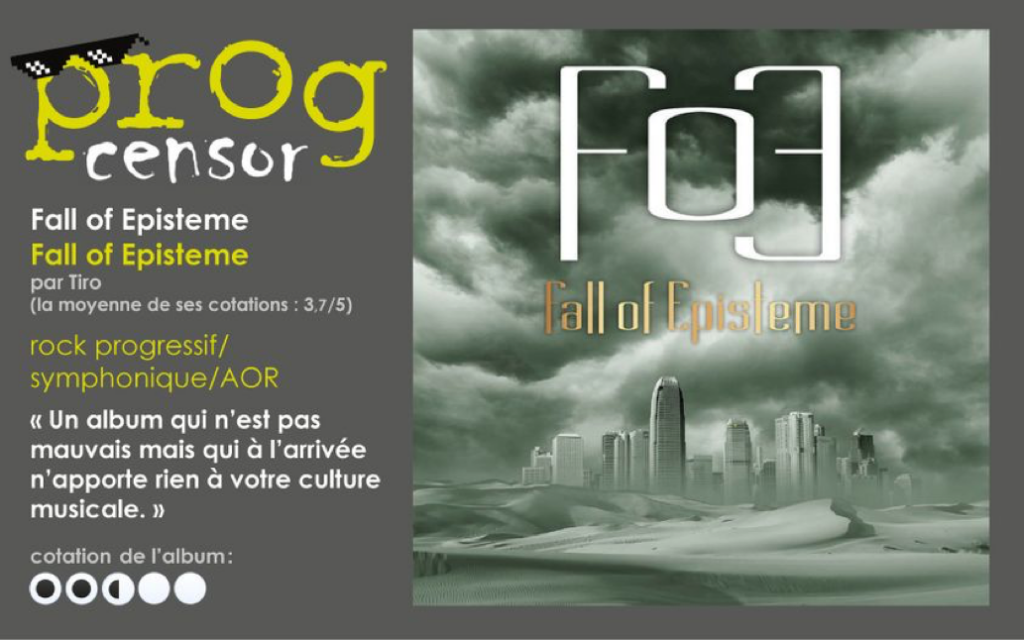
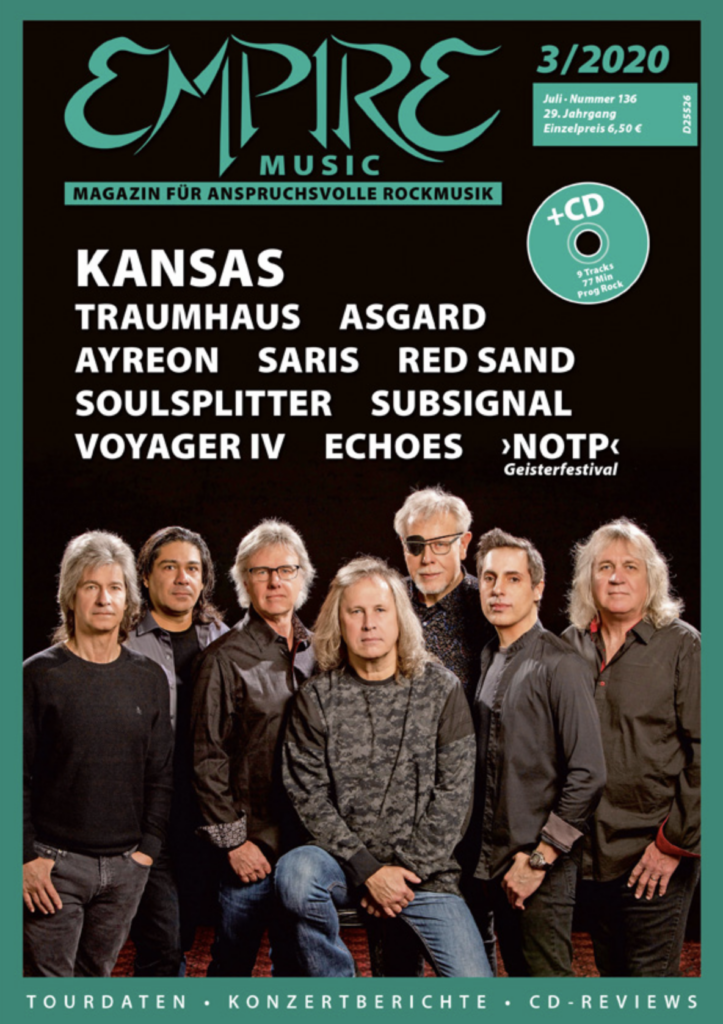
FALL OF EPISTEME
Fall Of Episteme
(Timescape Production, CD, 2019)
In den 80er-Jahren gab es in Dänemark eine Band namens Atlantis, nicht zu verwechseln mit der deutschen Formation um Inga Rumpf und Alex Conti aus den 70er-Jahren. Atlantis waren in der dänischen Clubszene aktiv und spielten beispielsweise auch auf dem ›Roskilde Festival‹. Der große Durchbruch gelang den Dänen jedoch nicht. Doch vor fünf Jahren fanden sich drei der ehemaligen Mitstreiter wieder zusammen und gründeten Fall Of Episteme. Es verwundert nicht, dass zum Teil auch Kompositionen aus der Atlantis-Zeit für das neue Album verwendet wurden. Fall Of Episteme ist eine positive Überraschung. Dem dänischen Quintett ist ein wunderbar altmodisches Album gelungen, das die gute alte Zeit des Neoprogs der 80er-Jahre abfeiert.
Ohne weitergehende Informationen würde man die Scheibe dem holländischen Neoprog zuordnen. Man fühlt sich an Bands wie Marathon oder For Absent Friends erinnert. Da
passt es ganz gut, dass der Sound aufgrund der satten Keyboardfanfaren Ähnlichkeiten zu Saga aufweist. Andere Passagen strahlen wiederum ein gewisses Marillion-Feeling aus. Sänger Rune M. Nielsons Stimme hingegen hat einen Touch von John Lees. Klar, das ist nicht wirklich neu und vielleicht auch nicht immer hundertprozentig perfekt (zum Beispiel der Chorgesang), aber mit viel Herzblut eingespielt.
Stärkster Titel des Albums ist der 15-minütige
Longtrack Invisible Crusader, dem es, beginnend mit einem Pianosolo, hervorragend
gelingt, Spannung aufzubauen und zu halten, um dann schließlich in einem bombastischen Finale zu enden. Fall Of Episteme ist ein durch und durch sympathisches Album, das vor allem Freunde des klassischen Neoprogs mit Saga-Touch gefallen wird. Daumen hoch!
Martin Dambeck
12 mei 2020 door Jacco Stijkel
Fall of Episteme is een band uit Denemarken die met een gelijknamige cd hun debuut uitbrengt. Toch bestaat FoE uit zeer ervaren muzikanten. De band werd in 2015 gevormd toen Søren Foged na jaren in Afrika te hebben gewoond terugkeerde naar Denemarken. Deze Foged speelde in de jaren ’80 in de progband Atlantis. Flemming Kragh (toetsen) en Kent Esklidsen (bas) waren ook actief in deze band en kwamen bij FoE. In eerste instantie werden er nummers van Atlantis in een nieuw jasje gespeeld, wat later werd er ook gewerkt aan nieuw materiaal. Vanwege persoonlijke omstandigheden verliet Foged in 2017 de band. Met een nieuwe bassist werd verder gewerkt aan de debuut-cd. Verder bestaat de band uit drummer Rune, de zoon van gitarist Kent. Zanger Rune Moeller Nielsen is geschoold in kerkzang en klassieke zang. In mijn ogen geeft hij de muziek van FoE echt iets extra’s.
Als invloeden voor hun muziek noemt FoE grote namen uit de prog als bijvoorbeeld Saga, Pink Floyd, Camel, Dream Theater en Marillion. Bij het beluisteren van hun muziek schoten bij mij vooral bands door mijn hoofd die toegankelijke neoprog maken, denk bijvoorbeeld aan Chandelier. Of Arena, maar dan wat minder intens. Doordat de toetsen vooral op de voorgrond komen en de gitaren meer ondersteunend zijn, is een vergelijk met This Winter Machine in mijn ogen op zijn plaats. Degelijk. Toegankelijk. Goed gemusiceerd. Symfonisch.
Openingsnummer Love will stay is een goed voorbeeld hiervan. Lekker up-tempo, songgericht en symfonisch. Wat vooral opvalt is de mooie zang van Rune Moeller Nielsen, die erg goed bij deze muziek past. Het tweede nummer Experience Oblige begint met een mooi stuk op piano. Daarmee word je echt het nummer ingetrokken. Het derde nummer, Accelerator, vind ik het verreweg het minste nummer op deze plaat. Het klinkt erg ééndimensionaal en het al niet bijster originele refrein wordt tot in den treuren herhaald… ‘Pump up the volume’… Ik weet het op een gegeven moment wel en moet mij echt inhouden om het geluid juist niet zachter te zetten. Punchline is ook een erg toegankelijk nummer, maar door het aanstekelijke refrein beter te verteren.
Het mooiste nummer vind ik het lange Invisible Crusader. Een erg mooie opening op toetsen van Flemming Kragh Pedersen, een mooie opbouw, en wederom valt de zang van Moeller Nielsen in positieve zin op. Hier laat FoE in een kwartier horen prima symfonische rock te kunnen maken en hoor ik wel wat van de kwaliteit van hun grote voorbeelden in de muziek terug.
Met Guiding Star eindigt deze cd behoorlijk sentimenteel, met een heuse tranentrekker. Nu is FoE niet de enige neoprogband die zoiets doet, Pendragon heeft er ook wel een handje van, maar ik mis dan de echte emotie in de muziek.
Door het hoorbare vakmanschap van de muzikanten blijft FoE wel aan de goede kant van de streep staan. Dat komt met name door de zang van Moeller Nielsen en de toetsen van Kragh Pedersen. Op zich maakt FoE symfonische rock die best te pruimen is, maar ik vind het te vaak te clichématig. Ik mis het avontuur en de originaliteit in de muziek. De band speelt wel heel erg op safe. In mijn ogen zou de band er goed aan doen minder de geijkte paden op te gaan, de degelijkheid wat te verlaten en meer avontuur te zoeken.
